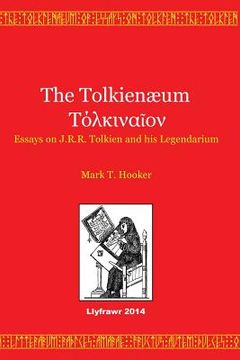The Tolkienaeum: Essays on J.R.R. Tolkien and his Legendarium (in English)
Synopsis "The Tolkienaeum: Essays on J.R.R. Tolkien and his Legendarium (in English)"
Beware of Pirated PDF Copies of The Tolkienaeum There are WebPages purporting to offer a free PDF download of The Tolkienaeum. This is a pirated copy, and is not authorized by me, or by Llyfrawr. To paraphrase Tolkien's reaction to the unauthorized edition of The Lord of the Rings brought out by ACE in 1965: Only the Llyfrawr paperback edition of The Tolkienaeum is published with my consent and cooperation. Those who approve of courtesy (at least) to living authors will purchase it and not download the PDF. The Tolkienaeum is the third volume on J.R.R. Tolkien's Legendarium by Tolkien researcher Mark T. Hooker, laureate of the Fifth Beyond Bree Award. The essays range from Tolkien's probable literary sources, to his historical allusions; from his philological jests, to his serious linguistics. They take a linguistic perspective that begins with a name or a word, and look for its story in the real world with which Tolkien was familiar. That is the essence of Tolkiennymy, a branch of Tolkien linguistics for which Hooker coined the name. The opening essay compares the similarities between the plots of Jules Verne's classic A Journey to the Centre of the Earth and The Hobbit. The Battle of Agincourt and the role that archers played in it are a part of the English mental legacy. They are contrasted with the Battle of Fornost to which the Hobbits sent bowmen. The cultural significance of a pocket-handkerchief in nineteenth-century England is the subject of one essay, while the natural history of the thrush is another. The legal import of 'a year and a day' is discussed in a third. The puns in the names Smallburrow and Tuckborough are considered in yet two others. The essays in search of a source for the word Hobbit that were serialized in Beyond Bree have been expanded for this volume. What is different about these essays is that they are by a linguist who shares Tolkien's appreciation of word histories, and who plays at the same kind of linguistic invention that Tolkien enjoyed. While the essays are linguistic, they were written with the non-linguist in mind. The unavoidable jargon of the field is explained in a glossary, and the narrative gives a non-technical view of how Tolkien's synthetic languages fit into the big picture of linguistics. A special feature of the second half of this volume is Tolkien's understanding and use of Proto-Indo-European (PIE) roots. The essay on the Tolkiennym for wolf, for example, reveals a PIE root that has lurked unrecognized in The Etymologies. Highlighting and explaining it reveal not only the trick that Tolkien is playing, but also the linguistic skill required to do it. Tolkien's extensive knowledge of mytho-linguistic issues is explored in an essay that explores the concept of animate-inanimate doublets developed by the prominent French linguist Antoine Meillet (1866-1936), who observed that the earlier forms of the Indo-European languages had doublet, animate-inanimate names for things like fire and water. Though there is no mention of Meillet in Tolkien's academic writings, there are Tolkiennyms that clearly replicate Meillet's doublets. Tolkien rightly noted that "many 'English' surnames, ranging from the rarest to the most familiar, are linguistically derived from Welsh (or British), even when that origin is no longer obvious." The etymology for the surname Gamgee is one of those cases. Also from this author: Tolkien Through Russian Eyes (Walking Tree Publishers, 2003), published simultaneously in Russian. "Frodo's Batman," Tolkien Studies, No. 1 (2004) A Tolkienian Mathomium (Llyfrawr, 2006) The Hobbitonian Anthology (Llyfrawr, 2009) Tolkien and Welsh (Llyfrawr, 2012) Iter Tolkienensis (Llyfrawr, 2016) Tolkien and Sanskrit (Llyfrawr, 2016)

